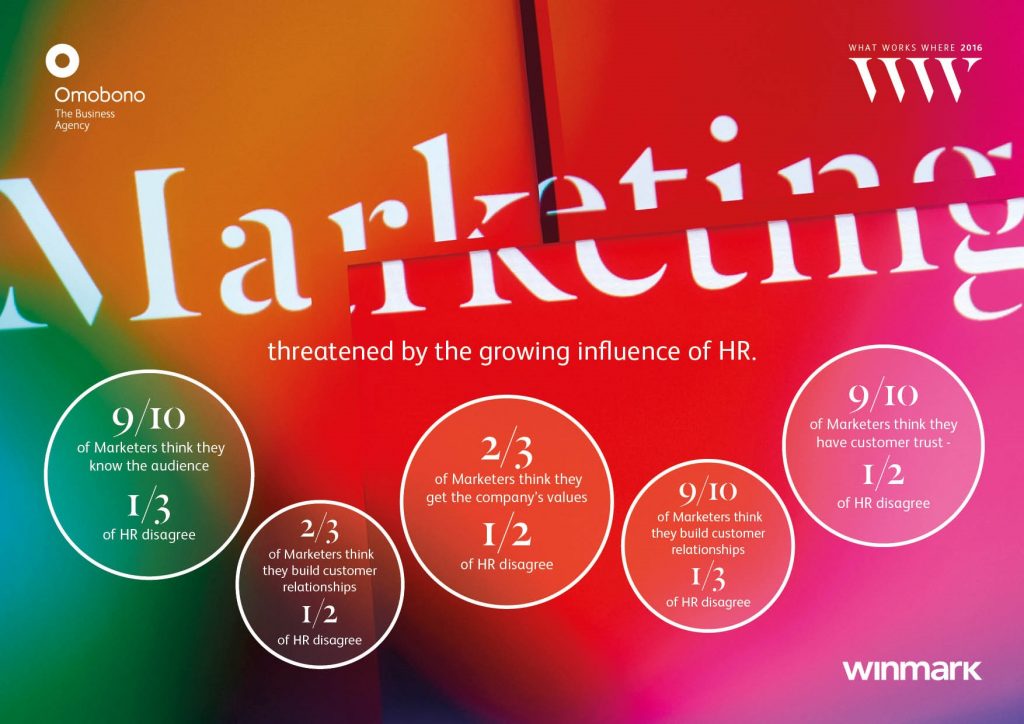Insight: Marketing Under Threat as HR Influence Rises
Posted by
 New research has shown that Marketing is under serious threat from HR, raising real questions for businesses and the teams charged with upholding the voice of their brand.
New research has shown that Marketing is under serious threat from HR, raising real questions for businesses and the teams charged with upholding the voice of their brand.
In a series of worrying findings for Marketing, Omobono, the creative and technology agency for business brands, has found that HR is now the second most powerful voice in the company. This, along with other stark findings, is documented in Omobono’s 2016 What Works Where report [WWW2016], in conjunction with Winmark Global.
Following 12 months of increased involvement, and increased investment in digital, HR has overtaken both sales and customer service in their use of digital channels, with 58% of respondents naming HR as a primary user of digital technologies, second only to Marketing (at 96%) and in front of customer service/key account management (51%) and sales (44%).
This is evidence that investment in digital is starting to pay off, with 75% of people agreeing that HR’s digital practices contribute to the overall brand profile and 46% of HR respondents saying they have developed a digital component in the past four years.
Even though HR has increasingly become more influential in digital, the majority of respondents recognise that an integrated approach to their company’s communications is hugely beneficial, rising dramatically since last year by an average of 50% for the top four benefits. These benefits of an integrated approach to communications include:
- Consistent messaging – 87% (up from 56% in 2015)
- More efficient communications – 82% (up from 61% in 2015)
- Stronger brand – 82% (up from 43% in 2015, so this has doubled)
- Better customer experience – this stays at the same level (45%)
Despite this recognition, corporate and employer branding lacks integration, with both sides giving it average scores (3.3/5 for Marketing and 3.0/5 for HR).
A crucial way to achieve integration is through collaboration. However, both time and willingness to collaborate are in the top six barriers to success, with departmental differences, lack of understanding about digital, lack of support for the leadership team and confusion over ownership being the other major barriers. It is therefore not a surprise that both departments score their ability to collaborate pretty averagely (3.3/5 for Marketing and 3.0/5 for HR).
This is further hindered by both departments KPIs not being structured to achieve collaboration. Measurement is focused on the wrong things, with both departments having ROI measures that tend to be focused on specific business outputs e.g. leads for Marketing and candidates and cost per hire for HR. To add to this, only 30% are measured on collaboration with other departments and only 7% are measured on whether the brand is consistent across the corporate and employee brands.
Francesca Brosan, Chairman, commented on the findings: “Digital has transformed the face of marketing, making communications a part of every department’s remit today. Our 2016 research shows that HR is evolving and having increasingly more influence on the overall brand profile, particularly through digital channels. These results underline the need for marketing and HR to try to be more integrated so that organisations can fully achieve the clear benefits of the brand being aligned from both internal and external perspectives.”
These findings are the result of six years uninterrupted research, 12 months of empirical data and 100 respondents split between HR and Marketing.







